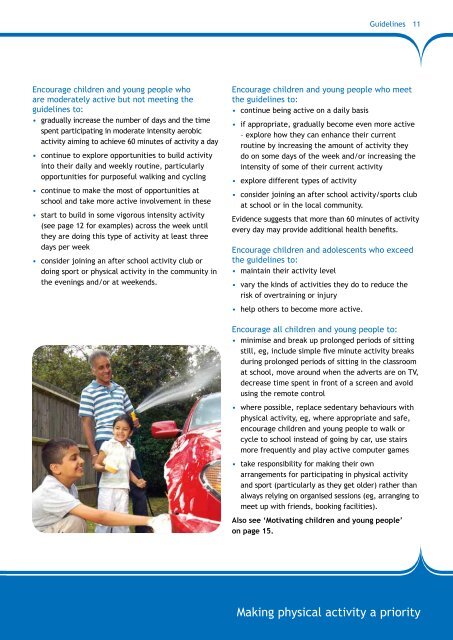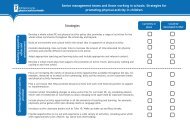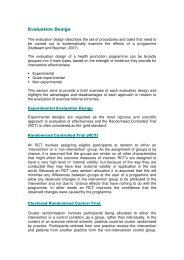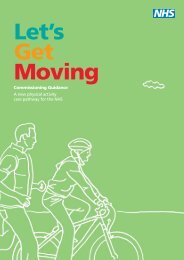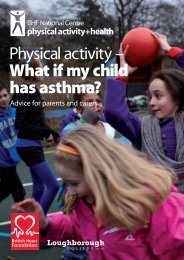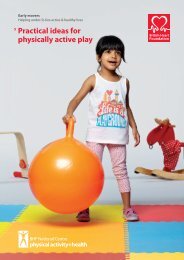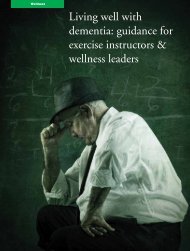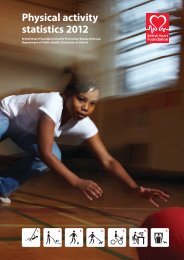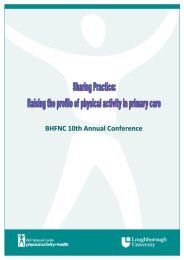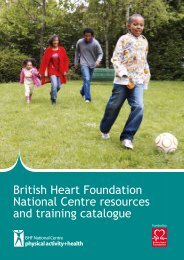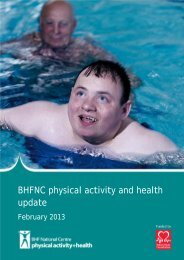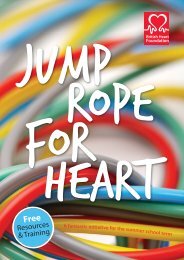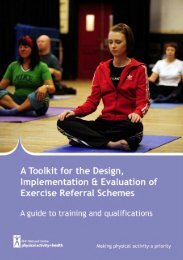Interpreting the UK physical activity guidelines for children and ...
Interpreting the UK physical activity guidelines for children and ...
Interpreting the UK physical activity guidelines for children and ...
You also want an ePaper? Increase the reach of your titles
YUMPU automatically turns print PDFs into web optimized ePapers that Google loves.
Guidelines<br />
11<br />
Encourage <strong>children</strong> <strong>and</strong> young people who<br />
are moderately active but not meeting <strong>the</strong><br />
<strong>guidelines</strong> to:<br />
• gradually increase <strong>the</strong> number of days <strong>and</strong> <strong>the</strong> time<br />
spent participating in moderate intensity aerobic<br />
<strong>activity</strong> aiming to achieve 60 minutes of <strong>activity</strong> a day<br />
• continue to explore opportunities to build <strong>activity</strong><br />
into <strong>the</strong>ir daily <strong>and</strong> weekly routine, particularly<br />
opportunities <strong>for</strong> purposeful walking <strong>and</strong> cycling<br />
• continue to make <strong>the</strong> most of opportunities at<br />
school <strong>and</strong> take more active involvement in <strong>the</strong>se<br />
• start to build in some vigorous intensity <strong>activity</strong><br />
(see page 12 <strong>for</strong> examples) across <strong>the</strong> week until<br />
<strong>the</strong>y are doing this type of <strong>activity</strong> at least three<br />
days per week<br />
• consider joining an after school <strong>activity</strong> club or<br />
doing sport or <strong>physical</strong> <strong>activity</strong> in <strong>the</strong> community in<br />
<strong>the</strong> evenings <strong>and</strong>/or at weekends.<br />
Encourage <strong>children</strong> <strong>and</strong> young people who meet<br />
<strong>the</strong> <strong>guidelines</strong> to:<br />
• continue being active on a daily basis<br />
• if appropriate, gradually become even more active<br />
– explore how <strong>the</strong>y can enhance <strong>the</strong>ir current<br />
routine by increasing <strong>the</strong> amount of <strong>activity</strong> <strong>the</strong>y<br />
do on some days of <strong>the</strong> week <strong>and</strong>/or increasing <strong>the</strong><br />
intensity of some of <strong>the</strong>ir current <strong>activity</strong><br />
• explore different types of <strong>activity</strong><br />
• consider joining an after school <strong>activity</strong>/sports club<br />
at school or in <strong>the</strong> local community.<br />
Evidence suggests that more than 60 minutes of <strong>activity</strong><br />
every day may provide additional health benefits.<br />
Encourage <strong>children</strong> <strong>and</strong> adolescents who exceed<br />
<strong>the</strong> <strong>guidelines</strong> to:<br />
• maintain <strong>the</strong>ir <strong>activity</strong> level<br />
• vary <strong>the</strong> kinds of activities <strong>the</strong>y do to reduce <strong>the</strong><br />
risk of overtraining or injury<br />
• help o<strong>the</strong>rs to become more active.<br />
Encourage all <strong>children</strong> <strong>and</strong> young people to:<br />
• minimise <strong>and</strong> break up prolonged periods of sitting<br />
still, eg, include simple five minute <strong>activity</strong> breaks<br />
during prolonged periods of sitting in <strong>the</strong> classroom<br />
at school, move around when <strong>the</strong> adverts are on TV,<br />
decrease time spent in front of a screen <strong>and</strong> avoid<br />
using <strong>the</strong> remote control<br />
• where possible, replace sedentary behaviours with<br />
<strong>physical</strong> <strong>activity</strong>, eg, where appropriate <strong>and</strong> safe,<br />
encourage <strong>children</strong> <strong>and</strong> young people to walk or<br />
cycle to school instead of going by car, use stairs<br />
more frequently <strong>and</strong> play active computer games<br />
• take responsibility <strong>for</strong> making <strong>the</strong>ir own<br />
arrangements <strong>for</strong> participating in <strong>physical</strong> <strong>activity</strong><br />
<strong>and</strong> sport (particularly as <strong>the</strong>y get older) ra<strong>the</strong>r than<br />
always relying on organised sessions (eg, arranging to<br />
meet up with friends, booking facilities).<br />
Also see ‘Motivating <strong>children</strong> <strong>and</strong> young people’<br />
on page 15.<br />
Making <strong>physical</strong> <strong>activity</strong> a priority


